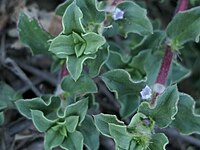Note: This is a project under development. The articles on this wiki are just being initiated and broadly incomplete. You can Help creating new pages.
Difference between revisions of "Spermacoce hispida"
(→Photo Gallery) |
|||
| Line 60: | Line 60: | ||
==Photo Gallery== | ==Photo Gallery== | ||
<gallery class="left" caption="" widths="140px" heights="140px"> | <gallery class="left" caption="" widths="140px" heights="140px"> | ||
| − | + | File:Spermacoce hispida L. (48913995073).jpg | |
| + | File:Spermacoce hispida-3-bsi-yercaud-salem-India.JPG | ||
| + | File:Spermacoce articularis (S hispida- Madanghanti) in Hyderabad, AP W2 IMG 9064.jpg | ||
</gallery> | </gallery> | ||
Revision as of 15:23, 30 May 2023
Spermacoce hispida is an annual to perennial, variable, creeping to erect, branched, short hairy herb, growing up to 15 cm tall. The plant is used in traditional medicine in southeast Asia, the plant being harvested from the wild. It is also used as a vegetable in Sri Lanka, where it is sold in local markets.
Contents
- 1 Uses
- 2 Parts Used
- 3 Chemical Composition
- 4 Common names
- 5 Properties
- 6 Habit
- 7 Identification
- 8 List of Ayurvedic medicine in which the herb is used
- 9 Where to get the saplings
- 10 Mode of Propagation
- 11 How to plant/cultivate
- 12 Commonly seen growing in areas
- 13 Photo Gallery
- 14 References
- 15 External Links
Uses
Parts Used
Chemical Composition
Common names
| Language | Common name |
|---|---|
| Kannada | Madanaganti, Doddadore |
| Hindi | Madana ghanti |
| Malayalam | |
| Tamil | Nattai churi |
| Telugu | Madana ganti |
| Marathi | |
| Gujarathi | |
| Punjabi | |
| Kashmiri | |
| Sanskrit | Madana Ghanti |
| English | Shaggi button weed |
Properties
Reference: Dravya - Substance, Rasa - Taste, Guna - Qualities, Veerya - Potency, Vipaka - Post-digesion effect, Karma - Pharmacological activity, Prabhava - Therepeutics.
Dravya
Rasa
Guna
Veerya
Vipaka
Karma
Prabhava
Habit
Identification
Leaf
| Kind | Shape | Feature |
|---|---|---|
Flower
| Type | Size | Color and composition | Stamen | More information |
|---|---|---|---|---|
| Flowering from July to January |
Fruit
| Type | Size | Mass | Appearance | Seeds | More information |
|---|---|---|---|---|---|
Other features
List of Ayurvedic medicine in which the herb is used
Where to get the saplings
Mode of Propagation
How to plant/cultivate
Commonly seen growing in areas
Open sandy lands, Behind beaches, In dry gardens, Teak forests, Along steep roadsides, On sandy soils, Locally abundant.
Photo Gallery
References
External Links
- Ayurvedic Herbs known to be helpful to treat Piles
- Ayurvedic Herbs known to be helpful to treat Dysentery
- Herbs with Leaf used in medicine
- Herbs with Seed used in medicine
- Herbs with common name in Kannada
- Herbs with common name in Hindi
- Herbs with common name in Tamil
- Herbs with common name in Telugu
- Herbs with common name in Sanskrit
- Herbs with common name in English
- Habit - Perennial
- Index of Plants which can be propagated by Seed
- Herbs that are commonly seen in the region of Open sandy lands
- Herbs that are commonly seen in the region of Behind beaches
- Herbs that are commonly seen in the region of In dry gardens
- Herbs that are commonly seen in the region of Teak forests
- Herbs that are commonly seen in the region of Along steep roadsides
- Herbs that are commonly seen in the region of On sandy soils
- Herbs that are commonly seen in the region of Locally abundant
- Herbs



